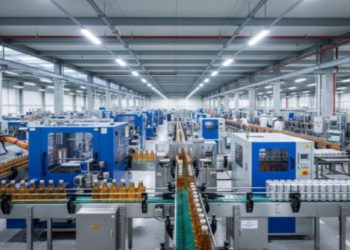Currently, manufacturing inventory software is one of the keys to waste minimisation in the manufacturing process. With companies seeking to produce sustainable products, pinpoint inventory control has become a new emerging factor in helping companies create less waste and run more efficiently. This is a critical way enhanced understanding of effective inventory management methods allows manufacturers to make a substantial reduction in their environmental footprint while also improving their bottom line.
The Role of Inventory Control in Waste Reduction
Inventory control lies at the foundation of every efficient manufacturing operation. When the materials and products become available just in time without being either too much or too little, then a properly managed control of inventory is working. There are many ways by which sharp inventory control can reduce wastage:
Reducing Overstock and Obsolescence: Overstock often results in excess inventory that may turn obsolete for the required condition. Manufacturing inventory software enables the tracking and managing of inventory levels in real time, which thereby enables businesses to order only the necessary material in just enough time for product manufacturing. This way, there is little to no chance of the material’s expiration, being outdated, or turned into waste.
Preventing Stockouts and Production Delays: On the other hand, understocking may result in production delays, which could further lead to idle time and lower efficiency of production. That is, with proper inventory management, the right level of the materials will always be on hand to manage the production lines proficiently, without causing scrap associated with production downtime.
Optimising Order Quantities: Manufacturing inventory software would have in place mechanisms that allowed it to base forecasts on a study of historical data, hence enabling likely modest means to optimise their order quantities. This way, they do not get to order more than what is required for immediate production use, hence minimising excess inventory and the risk of their materials turning into waste.
Enhancing Material Utilisation: Accurate inventory control maintains records of material usage. The information obtained from such records can be studied and trends, inefficiencies and patterns in the same trimmed out to save on material waste by shaping manufacturing processes accordingly. For example, by knowing which process has the greatest yield of scrap, a company will work toward process improvement, thus saving from potential waste.
Facilitating Recycling and Reuse: Inventory software is also in a position to track by-products and waste materials to determine reuse or recycling opportunities. By properly managing these materials, manufacturers can reduce the quantity of waste sent to landfills and create a more sustainable production cycle.
Strategies for Implementing Effective Inventory Control
To afford the benefits of manufacturing inventory software licensed with precise inventory control, manufacturers must fully embrace a number of core strategies.
Implement Advanced Inventory Management Systems: Implement state-of-the-art inventory management systems that include real-time monitoring, order replenishment automation and in-depth analytics. Such systems will provide data for making appropriate decisions on inventory levels and order quantities.
Adopt Lean Manufacturing Principles: Lean manufacturing focuses on zero waste and high levels of efficiency. Combining lean with the most up-to-date inventory management systems would enable manufacturers to fine-tune operations, maintain adequate stock and reduce wastage.
Conduct Regular Audits and Assessments: One can identify the wasteful areas through regular audits of inventory levels and each management practice. Manufacturers need to continuously appraise the associated inventory controlling processes for stay-ahead possibilities and to ensure they are operating as effectively and efficiently as possible.
Train Employees on Best Practices: Employees need to be trained to handle inventory properly. Inconsistencies within inventory control can be very costly and training in employees through accurate record-keeping and efficient material handling can reduce this waste drastically. In this way, besides maintaining a culture of continuous improvement, workers at the line level will be able to identify and correct inefficiencies.
Collaborate with Suppliers: Suppliers can play an important role in enhanced inventory control. Close coordination will help manufacturers extract a bigger bargain out of them, help ensure timely deliveries, or even collaborate on sustainability initiatives. This will yield direct benefits for inventory management efficiency and waste reduction.
The Broader Impact of Waste Reduction
Reduction in waste for the manufacturing sector has a significance that goes beyond cost reduction. Here are some of the broader impacts:
Environmental Sustainability: Reduced levels of waste essentially aid in maintaining the natural environment. With less waste, manufacturers reduce their carbon print, landfills are lessened, which conserves natural resources. It does not only help the environment but also helps to improve company public relations and portray it as one of the responsible corporate citizens.
Regulatory Compliance: Manufacturers must nevertheless adhere to several jurisdictions with hard regulations on waste and the environment. This is because effective inventory control and waste reduction strategies save manufacturers from such regulations, which can be very costly in terms of legal adversities arising from financial fines and other related conditions.
Enhanced Competitiveness: A company that focuses on the reduction of waste is more competitive in the market. Consumers are often very conscious of and appreciate environmental stewardship, thus usually tending to support businesses that demonstrate some concern for sustainability. Efficient inventory management equally saves on costs, which gives better relative competitive pricing.
Innovation and Growth: This drive toward waste reduction is among the major drivers of innovation. Manufacturers seeking new ways to minimise waste lead to develop innovative processes, products and technologies, which in turn go a long way to bettering sustainability and at the same time opening up opportunities to new markets and growth.
Conclusion
The inventory software for manufacturing would reduce the waste of the production industries, which will consequently support the industry to become sustainable. The manufacturer will gain a sufficient reduction in overstock and obsolescence and will not face any stockouts. Most importantly, it will help in producing or ordering the right quantity within lead time, making better use of materials-such land, resources, etc—with reuse and recycling effects. All these could only be possible through effective inventory management systems, ISO, Lean Manufacturing techniques, frequent audits, other training for employees and close collaboration with their suppliers.
Wider benefits that can be achieved from waste reduction are environmental sustainability, compliance with the rules, enhanced competitiveness, development of innovation and opportunities. Precise inventory control, coupled with waste reduction, will provide a grounding for manufacturing towards efficient, sustainable and profitable operation.
David Prior
David Prior is the editor of Today News, responsible for the overall editorial strategy. He is an NCTJ-qualified journalist with over 20 years’ experience, and is also editor of the award-winning hyperlocal news title Altrincham Today. His LinkedIn profile is here.













































































